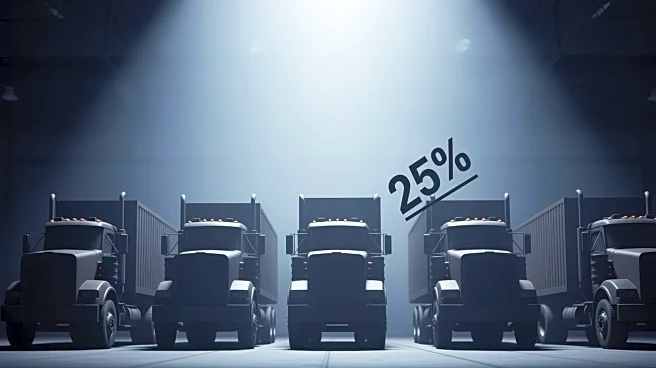What's Happening?
The White House has implemented a 25% tariff on imported heavy-duty trucks, effective November 1. This decision, announced by President Trump, aims to protect U.S. truck manufacturers from foreign competition
and strengthen national security by boosting domestic production. The tariff is part of a broader strategy to stabilize the U.S. market share of domestically produced medium- and heavy-duty vehicles at around 80% and reduce reliance on foreign supply chains. The U.S. Chamber of Commerce has expressed concerns, noting that major import sources like Mexico, Canada, Japan, Germany, and Finland are allies and pose no national security threat. The tariff could significantly impact the trucking industry, with experts suggesting that companies need to adapt strategically to mitigate its effects.
Why It's Important?
The imposition of this tariff is significant as it introduces a new layer of uncertainty for U.S. shippers, potentially affecting their capital investment decisions and cost management strategies. The trucking industry, already facing challenges with declining OEM truck orders and rising inventories, may see further disruptions. The tariff could lead to increased costs for shippers, particularly those with private fleets, impacting replacement rates and cycles. While the tariff aims to bolster domestic manufacturing, it may also strain relationships with key trading partners and complicate supply chain dynamics. Companies that can innovate in product design and procurement may find opportunities amidst these challenges.
What's Next?
Shippers and industry stakeholders are likely to monitor the situation closely, assessing the tariff's impact on their operations and exploring strategies to minimize costs. The U.S. Chamber of Commerce and other industry groups may continue to advocate for policy adjustments, emphasizing the importance of maintaining strong trade relationships with allied nations. Companies may need to prioritize long-term carrier relationships and adapt to the evolving market conditions. The tariff's long-term effects on the trucking industry and broader economic implications will depend on how businesses and policymakers respond to these new challenges.









